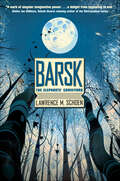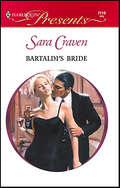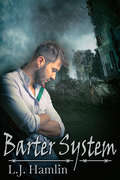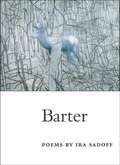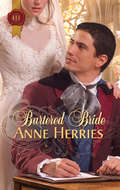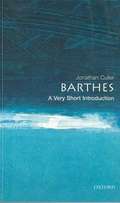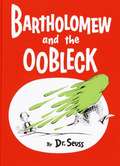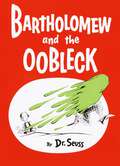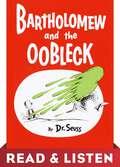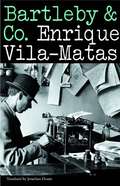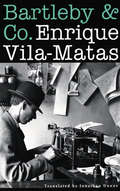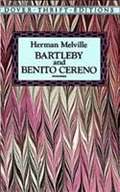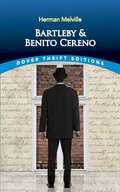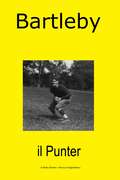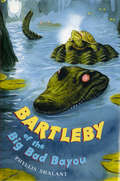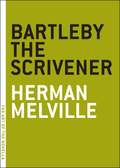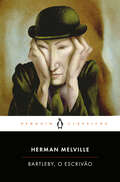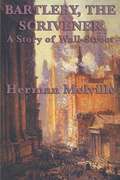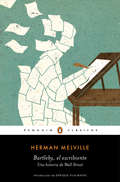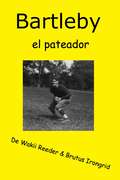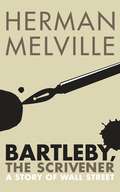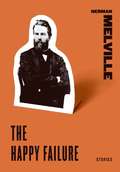- Table View
- List View
Barsk: The Elephants' Graveyard (Barsk Ser. #1)
by Lawrence M. SchoenThe Sixth Sense meets Planet of the Apes in a moving science fiction novel set so far in the future, humanity is gone and forgotten in Lawrence M. Schoen's Barsk: The Elephants' GraveyardAn historian who speaks with the dead is ensnared by the past. A child who feels no pain and who should not exist sees the future. Between them are truths that will shake worlds.In a distant future, no remnants of human beings remain, but their successors thrive throughout the galaxy. These are the offspring of humanity's genius-animals uplifted into walking, talking, sentient beings. The Fant are one such species: anthropomorphic elephants ostracized by other races, and long ago exiled to the rainy ghetto world of Barsk. There, they develop medicines upon which all species now depend. The most coveted of these drugs is koph, which allows a small number of users to interact with the recently deceased and learn their secrets. To break the Fant's control of koph, an offworld shadow group attempts to force the Fant to surrender their knowledge. Jorl, a Fant Speaker with the dead, is compelled to question his deceased best friend, who years ago mysteriously committed suicide. In so doing, Jorl unearths a secret the powers that be would prefer to keep buried forever. Meanwhile, his dead friend's son, a physically challenged young Fant named Pizlo, is driven by disturbing visions to take his first unsteady steps toward an uncertain future.At the Publisher's request, this title is being sold without Digital Rights Management Software (DRM) applied.
Bart escapó por la puerta
by Lisa ReinickeUn niño se olvida de cerrar la puerta y su mascota dinosario se escapa causando un gran lío. El niño tiene que ser creativo para capturar al dinosaurio y devolverlo al corral. Luego, el niño comienza a limpiar para ocuparse de lo que se rompió debido al error que cometió.
Bartaldi's Bride (Wedlocked!)
by Sara CravenClare usually ran a mile from powerful, sensual men like Guido Bartaldi. Only, she’d agreed to live under Guido’s roof as companion to his wayward ward, the young woman clearly destined to become Guido’s wife…Horrified at Guido’s marriage plans, Clare soon decided to leave—and found herself all by captive in Guido’s palatial villa. Then she realized it was she who’d been chosen as Bartaldi’s bride!
Barter System
by L. J. HamlinYoung Willow was born in the Iron Settlement, one of several save zones built after the world as we know it was destroyed by war. He’s been pining after someone, a man who will finally acknowledge having feelings for Willow.Handsome Jay is known as a traveler, a man familiar with all the dangers outside the safety of the settlements. This time, however, Jay’s battle is to overcome the injury that left him walking with a limp, which alienated him from people in the settlements.Will Jay and Willow be able to move from a steady friendship to budding romance while they explore the dangerous ruins from before the end times? How will Jay react when Willow presents him with a rare gift? Can Willow learn to barter with Jay and earn the love he craves?
Barter: POEMS
by Ira SadoffIra Sadoff's new volume of poems opens with a quotation from Rilke: "But because truly being here is so much; because everything here / apparently needs us, the fleeting world, which in some strange way / keeps calling us. . . ." The poetry collected here is a response to this call. Rooted firmly in the "fleeting world," Sadoff's poems find epiphanies of meaning in unexpected and even unpleasant experiences and emotions. The poems in Barter delve deeply into the past, the personal past of regret, travel, love, divorce, and bereavement, as well as the global past of Beethoven, Vietnam, and the fall of communism. Each poem is offered up by Sadoff as a barter, something to be traded for a little more time, a little more understanding. The poems in Barter comment on the power of culture to interject itself into our desire for an idealized self, the way our inner and outer lives lack correspondence, harmony, and integration. They also talk about commerce, the trading of bodies, the way we as a nation "use" and exchange and appropriate -- and like Tolstoy's Ivan Ilyich, try to bargain with and evade the urgency of our time on earth. In the poem "Self-Portrait with a Critic," Sadoff makes what could be a succinct statement of purpose: "And inside, let's not make it pretty, / let's save the off-rhyme and onomatopoeia / / for the concert hall, let's go to the wormy place / where the problematic stirs inside his head."
Bartered Bride
by Anne HerriesHer hand in marriage traded in a game of cards, innocent Lottie is completely out of her depth engaged to consummate bachelor Lord Rothsay. Not only is he a prolific womanizer, he's also got a ruthless streak, leaving Lottie fearful about revealing that she isn't the woman he'd agreed to marry! Rothsay should have no qualms about ending this folly of a betrothal, especially when he learns he has been deceived. But sweet-natured Lottie has got under his skin and suddenly he wants to turn his inconvenient fianc#xE9;e into a wife for real!
Barthes: A Very Short Introduction
by Jonathan CullerRoland Barthes was the leading figure of French Structuralism, the theoretical movement of the 1960s which revolutionized the study of literature and culture, as well as history and psychoanalysis. But Barthes was a man who disliked orthodoxies. His shifting positions and theoretical interests make him hard to grasp and assess. This book surveys Barthes' work in clear, accessible prose, highlighting what is most interesting and important in his work today. In particular, the book describes the many projects, which Barthes explored and which helped to change the way we think about a range of cultural phenomena--from literature, fashion, wrestling, and advertising to notions of the self, of history, and of nature.
Bartholomew Roberts' Justice: Eine Piratengeschichte (The Pirate Priest #2)
by Jeremy McLean⚓ Feinde wohin man blickt. Der Schatz eines Königs am Horizont. Der Pirat Roberts setzt die Segel.⚓ Bartholomew Roberts hat das Piratenleben mit einer rücksichtslosen Hingabe angenommen, sehr zur Freude seiner neuen Crew. Unter seiner Führung sieht ihr Schicksal rosig aus, doch die Stimmung an Bord der Royal Rover ist nicht wie sie scheint. Bevor Roberts und seine Crew den nächsten Erfolg einheimsen können, muss er seine Crew zunächst vor dem Galgen retten und aus einem Gefängnis befreien. Danach entscheidet sich Roberts für eine Position, mit der viele Besatzungsmitglieder nicht einverstanden sind, und entfacht so einen Funken der Rebellion. Walter Kennedy möchte währenddessen unbedingt Captain der Royal Rover werden. Er sieht seine Chance gekommen. Wird Walter seinen alten Freund wegen seines Ehrgeizes verraten? Kann Roberts seine Überzeugungen und seinen Kopf gegen diejenigen behaupten, die sich ihm widersetzen? Das und mehr erfahren Sie in seinen Kurzgeschichten voller Action, Abenteuern, Piraten und Freibeutern, die im Goldenen Zeitalter der Piraterie dort spielen, wo Roberts Prüfungen ihn hinführen.
Bartholomew and the Oobleck
by Dr SeussAn ooey-gooey, green oobleck was not exactly what the king had in mind when he ordered something extra-special from his royal magicians.
Bartholomew and the Oobleck (Classic Seuss)
by Dr. SeussJoin Bartholomew Cubbins in Dr. Seuss&’s Caldecott Honor–winning picture book about a king&’s magical mishap! Bored with rain, sunshine, fog, and snow, King Derwin of Didd summons his royal magicians to create something new and exciting to fall from the sky. What he gets is a storm of sticky green goo called Oobleck—which soon wreaks havock all over his kingdom! But with the assistance of the wise page boy Bartholomew, the king (along with young readers) learns that the simplest words can sometimes solve the stickiest problems.
Bartholomew and the Oobleck: Read & Listen Edition (Classic Seuss)
by Dr. SeussIn this Caldecott Honor–winning picture book, join Bartholomew Cubbins in Dr. Seuss&’s classic tale of one king&’s magical mishap. Bored with rain, sun, fog, and snow, King Derwin of Didd summons his royal magicians to create something new and exciting to fall from the sky. What he gets is a storm of sticky green globs called Oobleck, which soon causes a royal mess. But with the assistance of the wise page boy Bartholomew, the king (along with young readers) learns that the simplest words can sometimes solve the biggest problems.This Read & Listen edition contains audio narration.
Bartleby & Co.
by Enrique Vila-Matas Jonathan DunneTranslated from the Spanish by Jonathan Dunne. In Bartleby & Co., Enrique Vila-Matas tackles the theme of silence in literature: the writers and non-writers who, like the scrivener Bartleby of the Herman Melville story, in answer to any question or demand, replies: "I would prefer not to." Addressing such "artists of refusal" as Robert Walser, Robert Musil, Arthur Rimbaud, Marcel Duchamp, Herman Melville, and J. D. Salinger, Bartleby & Co. could be described as a meditation: a walking tour through the annals of literature. Written as a series of footnotes (a non-work itself), Bartleby embarks on such questions as why do we write, why do we exist? The answer lies in the novel itself: told from the point of view of a hermetic hunchback who has no luck with women, and is himself unable to write, Bartleby is utterly engaging, a work of profound and philosophical beauty.
Bartleby & Co.
by Enrique Vila-Matas Jonathan DunneA marvelous novel by one of Spain's most important contemporary authors, in which a clerk in a Barcelona office takes us on a romping tour of world literature. In Bartleby & Co., an enormously enjoyable novel, Enrique Vila-Matas tackles the theme of silence in literature: the writers and non-writers who, like the scrivener Bartleby of the Herman Melville story, in answer to any question or demand, replies: "I would prefer not to." Addressing such "artists of refusal" as Robert Walser, Robert Musil, Arthur Rimbaud, Marcel Duchamp, Herman Melville, and J. D. Salinger, Bartleby & Co. could be described as a meditation: a walking tour through the annals of literature. Written as a series of footnotes (a non-work itself), Bartleby embarks on such questions as why do we write, why do we exist? The answer lies in the novel itself: told from the point of view of a hermetic hunchback who has no luck with women, and is himself unable to write, Bartleby is utterly engaging, a work of profound and philosophical beauty.
Bartleby and Benito Cereno
by Herman Melville Stanley ApplebaumTWO STORIES by the great American writer Herman Melville. "Bartleby" reflects the author's family knowledge of the business world and "Benito Cereno" draws heavily on his seafaring experiences.
Bartleby and Benito Cereno: The Scrivener, And The Encantadas (Dover Thrift Editions)
by Herman MelvilleHerman Melville towers among American writers not only for his powerful novels, but also for the stirring novellas and short stories that flowed from his pen. Two of the most admired of these — "Bartleby" and "Benito Cereno" — first appeared as magazine pieces and were then published in 1856 as part of a collection of short stories entitled The Piazza Tales."Bartleby" (also known as "Bartleby the Scrivener") is an intriguing moral allegory set in the business world of mid-19th-century New York. A strange, enigmatic man employed as a clerk in a legal office, Bartleby forces his employer to come to grips with the most basic questions of human responsibility, and haunts the latter's conscience, even after Bartleby's dismissal."Benito Cereno," considered one of Melville's best short stories, deals with a bloody slave revolt on a Spanish vessel. A splendid parable of man's struggle against the forces of evil, the carefully developed and mysteriously guarded plot builds to a dramatic climax while revealing the horror and depravity of which man is capable.Reprinted here from standard texts in a finely made, yet inexpensive new edition, these stories offer the general reader and students of Melville and American literature sterling examples of a literary giant at his story-telling best.
Bartleby il punter
by Wakii Reader Brutus GrigliadiferroQuesto racconto prende il celebre “Bartleby lo scrivano” di Hermann Melville, lo rimescola con l’ambiente del football americano liceale e ne trae una storia piuttosto folle in cui un giovane giocatore fa uscire completamente di testa il suo allenatore. Se avete praticato il football, o magari il rugby, o qualunque altro sport, questo libro vi piacerà sicuramente. Il libro include un questionario. Dedico quest’opera ai miei allenatori di football, specialmente quelli a cui ho accelerato la calvizie e che mi hanno urlato contro quando me lo meritavo. I personaggi ripresi e modificati includono: Bartleby, Ginger Nut, Grubman, Nippers, Turkey, Achab, Ismaele, Stubb, Queequeg, Starbuck, padre Mapple, Tashtego, Daggoo, Flask e Yorpy.
Bartleby of the Big Bad Bayou
by Phyllis ShalantBartleby, the red-eared turtle, and Seezer, the American alligator, have swum the Mighty Mississippi to reach bayou country, their true home. But when they find the creek where Seezer was born, they discover it's ruled by Old Stump-a giant gator with a gargantuan appetite. Fortunately, Bartleby has a knack for making friends, and there is soon a new crew to count on, including a red-ear named Lucky Gal. Still, life in bayou country is full of challenges. Does Bartleby have what it takes to make this strange new world his own? Readers will cheer for the tiny but tough hero in this pageturning sequel to Bartleby of the Mighty Mississippi.
Bartleby the Scrivener: Large Print (The Art of the Novella)
by Herman Melville"I prefer not to," he respectfully and slowly said, and mildly disappeared. Academics hail it as the beginning of modernism, but to readers around the world--even those daunted by Moby-Dick--Bartleby the Scrivener is simply one of the most absorbing and moving novellas ever. Set in the mid-19th century on New York City's Wall Street, it was also, perhaps, Herman Melville's most prescient story: what if a young man caught up in the rat race of commerce finally just said, "I would prefer not to"? The tale is one of the final works of fiction published by Melville before, slipping into despair over the continuing critical dismissal of his work after Moby-Dick, he abandoned publishing fiction. The work is presented here exactly as it was originally published in Putnam's magazine--to, sadly, critical disdain. Too short to be a novel, too long to be a short story, the novella is generally unrecognized by academics and publishers. Nonetheless, it is a form beloved and practiced by literature's greatest writers. In the Art Of The Novella series, Melville House celebrates this renegade art form and its practitioners with titles that are, in many instances, presented in book form for the first time.
Bartleby, O Escrivão
by Herman MelvilleResponsável por uma tarefa profissional rotineira e desinteressante, Bartleby vai trocando o entusiasmo inicial por uma progressiva e insistente recusa em desempenhar as funções para que foi contratado. Uma obra-prima da literatura americana com tradução de Tatiana Faia e introdução de Pedro Sobrado. »"Bartleby, podia dar um pulo aos correios e ver se há alguma coisa para mim?" "Preferia que não."» Num escritório em Wall Street, um reconhecido advogado contrata um jovem escrivão, Bartleby, para ajudar a dar vazão ao incremento de trabalho. De início, Bartleby revela-se exímio no desempenho das suas funções de copiar documentos legais. Um dia, porém, quando é requisitado para rever um texto, o escrivão declina o pedido declarando, para absoluta surpresa do advogado e do leitor, que "preferia que não". A tensão vai crescendo à medida que Bartleby se nega a cumprir cada vez mais tarefas, não deixando muitas opções ao advogado e narrador desta história singular. Aclamado como um precursor do Modernismo e do Absurdo na literatura, Bartleby, o Escrivão, publicado originalmente em 1853 na Putnam's Monthly Magazine, é apontado como um dos mais notáveis e influentes contos da literatura americana, onde Herman Melville reflete sobre uma sociedade em acelerada transformação e desumanização.
Bartleby, The Scrivener: A Story of Wall-Street
by Herman MelvilleBartleby the Scrivener (1853), by Herman Melville, tells the story of a quiet, hardworking legal copyist who works in an office in the Wall Street area of New York City. One day Bartleby declines the assignment his employer gives him with the inscrutable "I would prefer not." The utterance of this remark sets off a confounding set of actions and behavior, making the unsettling character of Bartleby one of Melville's most enigmatic and unforgettable creations.
Bartleby, el escribiente: Una historia de Wall Street (Akal Bolsillo Ser. #39)
by Herman MelvilleConmemoramos el bicentenario del nacimiento de Melville con la edición de una de sus obras más célebres que incluye, además, una introducción de Enrique Vila-Matas. «Preferiría no hacerlo -repetí yo como si fuera su eco, levantándome muy alterado y cruzando la habitación de una zancada-. ¿Qué quiere decir?» Considerada una obra maestra de la narración corta, Bartleby, el escribiente constituye una pieza anticipatoria de la literatura existencialista y del absurdo. A través del protagonista, un escribiente que se enfrenta a las demandas de la realidad con una inquietante respuesta, «preferiría no hacerlo», el estoicismo, la ironía, el humor y el sordo desasosiego alegórico presente en la obra del Melville se aúnan para expresar la obstinación del ser humano en su afán de obtener respuesta a las grandes preguntas o, al menos, seguir buscándolas. Esta edición presenta una traducción de María José Chulia y una brillante introducción de Enrique Vila-Matas, que reflexiona sobre esta historia que tiene un claro paralelismo con Kafka y ha influenciado a autores como Beckett, Camus, Gombrowicz o el mismo Vila-Matas.
Bartleby, el pateador
by Wakii ReederEsta historia toma el "Bartleby el escribiente" de Melville y lo mezcla con el fútbol de la escuela secundaria para hacer una historia disparatada de un jugador que saca de quicio al entrenador. Si has jugado al fútbol en la escuela secundaria (o en cualquier otro deporte), te encantará esta historia. El libro incluye una guía de discusión. Este libro está dedicado a mis entrenadores de fútbol. Especialmente a los que he contribuido a su calvicie y me han regañado cuando me lo he buscado. Entre los personajes deformados de Melville se encuentran: Bartleby, Ginger Nut, Grubman, Nippers, Turkey, Ahab, Ishmael, Stubb, Queequeg, Starbuck, Father Maple, Tashtego, Daggoo, Flask y Yorpy.
Bartleby, the Scrivener: A Story of Wall Street
by Herman MelvilleA deceptively simple premise – a scrivener who refuses to work – gives way to one of the most spectacular works of a great American author. When a Manhattan lawyer’s workload increases, he hires a new scrivener to help manage the workload. At first Bartleby, is an excellent addition to the office. But when his productivity starts dropping – and doesn’t stop – his boss has to intervene. Yet he is baffled when the only answer he can get from Bartleby about working is, “I would prefer not to.” Bartleby refuses to work, but refuses to leave. What’s to be done with Bartleby? Penguin Random House Canada is proud to bring you classic works of literature in e-book form, with the highest quality production values. Find more today and rediscover books you never knew you loved.
Bartleby, the Scrivener: A Story of Wall-Street
by Herman MelvilleHerman Melville was an 18th century American novelist, poet, essayist and short story writer. He is best known for his works Moby Dick and Typee. During his lifetime he was considered a failure, but after his death his worth as a writer was recognized. Bartleby is a novella, which first appeared in Putnam's Magazine. The narrator is an elderly lawyer who helps his clients with mortgages, titles and bonds. The lawyer's office has two employees Nippers and Turkey. Turkey is a drunk and Nippers has indigestion. The office is able to function because Nippers indigestion is at a time when Turkey is sober and Turkey is hung over when Nippers is feeling better. Bartleby is hired in the hopes that his temperament will calm down the office. As the story progresses Melville brings a sense of the human condition as seen through the eyes of a lowly employee.
